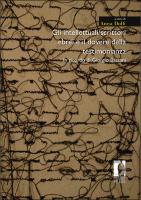Gli intellettuali/scrittori ebrei e il dovere della testimonianza
In ricordo di Giorgio Bassani
Contributor(s)
Dolfi, Anna (editor)
Language
ItalianAbstract
“A humanity that forgets Buchenwald, Auschwitz, Mauthausen, I cannot accept it. I write for us to remember”: this was Giorgio Bassani’s answer to anyone who asked him about the origin of his writing. Guided by these words, Anna Dolfi has woven a fabric of suggestions that have pushed Italian and foreign scholars and even some protagonists to reflect on narrators, poets, essayists, historians, philosophers, publishers, artists, who have been induced by the history of a difficult affiliation to a sort of fatal, testimonial moral duty. The result was a book of great novelty for style and reading proposals which, starting from the ancient Jewish tradition, from legends relived in a political and libertarian key, after the Romanticism and the German 19th Century, brings to the fore the modern voices of European and North American literature/culture, and of the Yiddish and Eastern tradition. The names of the great Jewish intellectuals of Central Europe are recurring: Canetti, Schulz, Döblin, Antelme, Wiesel, Sebald, Oz, Grossman, Nelly Sachs, Irène Némirovsky..., among the Italians those of Loria, Natalia Ginzburg, Giacomo Debenedetti, Cesare Segre..., but especially Giorgio Bassani and Primo Levi who, in order to keep the memory of the tragedy of persecution and the Shoah, have chosen to place their entire work “entre la vie et la mort”. Eventually, all this leads to remembering how the duty to testify is linked to the affection and work of mourning, to the lasting effect of an immediate wound that nourishes the connection between the truth of what happened and what one might call the “truth of creation”, le vrai du roman.


 Download
Download Web Shop
Web Shop